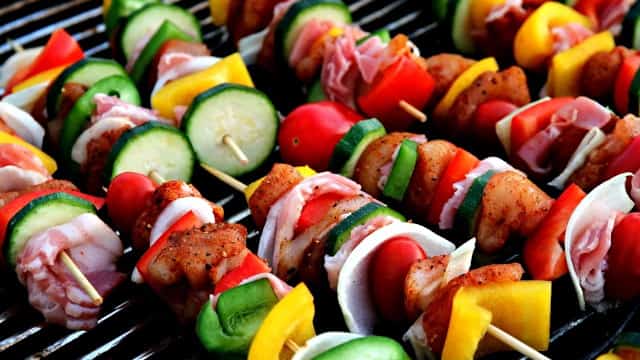Tips From Our Dietitian: Grilling Healthy Food

Warmer weather means it’s time to get out of the kitchen and fire up the barbecue. While grilled foods are packed with flavor, the way you prepare them can have a big impact on how healthy they are. Our dietitian Alexa has some tips to keep your grilled food healthy. Follow these simple steps for a cookout that’s tasty and good for you:
- Start out clean. Don’t let the charred buildup on your grill transfer to your meal. Use a wire brush to give your grill a good cleaning.
- Smoke and fire. Exposing protein-rich meat, poultry, and fish to high heat and open flames creates heterocyclic amines. When fat drips and burns on the grill, the resulting smoke contains polycyclic aromatic hydrocarbons. These 2 groups of chemicals have been linked to various types of cancer. You can reduce the formation of heterocyclic amines and polycyclic aromatic hydrocarbons several ways: Line the grill with foil perforated with holes, cook for longer at a lower temperature or have a spray bottle filled with water handy to control fatty flare-ups.
- Marinating food for a while before cooking limits the formation of potential carcinogens while grilling. Recipes with healthy marinades will add flavor to whatever you are grilling. If you rely on bottled marinades, choose those that are low in salt and sugar.
- Give veggies and fruit a chance.Grilling intensifies the flavor of fruits and vegetables, just as it does for meat. Kebabs that alternate meat with pieces of onion, pepper, squash, pineapple or other produce are a great way to increase vegetable and fruit intake.
- Practice safe grilling.Keep raw meat, poultry, and seafood separate from vegetables and other foods. Use a food thermometer to check the internal temperature of grilled meat, poultry, and seafood. Place grilled foods on clean plates, not on the ones that held them when they were raw.
PROTEIN is a component of every cell in the human body and is necessary for proper growth and development, especially during childhood, adolescence, and pregnancy. Protein helps your body build and repair cells and body tissue. It is a major part of your skin, hair, nails, muscle, bone, and internal organs and is important for many body processes, such as blood clotting, fluid balance, immune response, vision, and production of hormones and enzymes. Protein foods are great sources of vitamins and minerals such as B vitamins (for example, niacin, riboflavin, vitamin B6, and vitamin B12), choline, copper, iron, phosphorus, selenium, vitamin D, vitamin E, and zinc
Selection Tips:
- Choose lean protein options such as poultry, fish, eggs, and leaner red meats (such as 93% meat 7% fat ground beef)
- Processed meats such as ham, sausage hot dogs, and deli meats have added sodium. Be sure to check the Nutrition Facts label to help limit sodium intake.
- Switch it up with some plant sources of protein such as; beans, nuts, legumes, vegetables, grains, and soy products!
How much is enough?
The Institute of Medicine recommends that adults get a minimum of 0.8 grams of protein for every kilogram of body weight per day. (1kg. equals 2.2 pounds) The Institute of Medicine also sets a wide range for acceptable protein intake anywhere from 10 to 35% of total calories each day.


